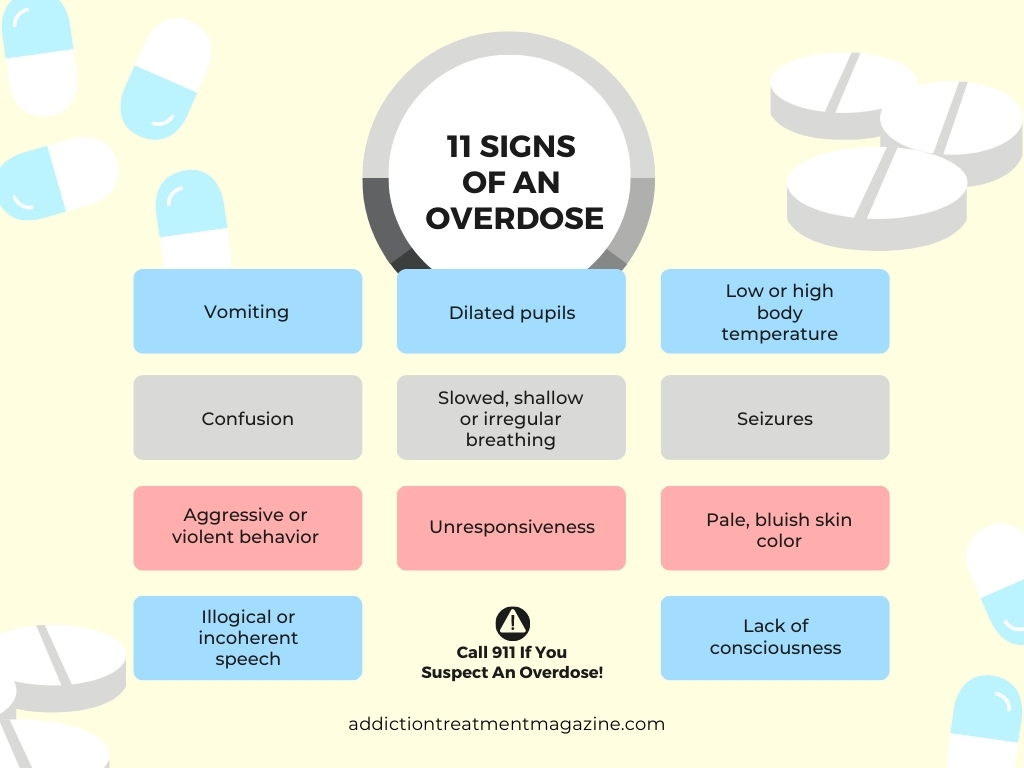A drug or alcohol overdose is a severe condition that can lead to permanent organ damage or death. An overdose occurs when a chemical substance is consumed in an amount so great and in a period of time so short that the body cannot process it quickly enough. Inevitably, vital organ functions change greatly or eventually stop. The ability to recognize an overdose and act quickly and appropriately could save their life. The signs of an overdose may vary slightly depending on certain factors, such as the substance(s) used. However, 11 common signs of an overdose to pay attention to include:
- Vomiting
- Confusion
- Aggressive or violent behavior
- Illogical or incoherent speech
- Dilated pupils
- Slowed, shallow or irregular breathing
- Unresponsiveness
- Lack of consciousness
- Low or high body temperature
- Pale, bluish skin color
- Seizures

Vomiting
One of the body’s methods of dealing with toxins is to expel them via vomiting. Particularly if someone consumed too much of a drug orally, then the body will recognize it as a toxin and it will lead to vomiting. Most chemical substances begin to enter the bloodstream immediately after being consumed, but vomiting helps clear out the stomach contents and eliminate any of the substance left in that cavity. This could reduce the amount of the substance that the body has to process and could save the individual’s life. However, the concentration of a drug in the bloodstream can continue to rise even if they are unconscious. If someone begins to vomit when they are unconscious then they may choke on the vomit, aspirate, and die. For this reason, when someone is experiencing an overdose, it is advised to roll them on their side. In this position, they are significantly less likely to aspirate if they vomit.
Confusion
High amounts of certain substances can lead to significant cognitive impairment and brain function. One of the ways in which this presents is confusion. During an overdose, the subject may not even be aware of where they are or what is going on. Peers may find them asking questions that to a sober person have obvious answers, or acting in a way that is not appropriate.
Aggressive or Violent Behavior
Another way in which overdose-related cognitive impairment may present is through aggressive or violent behaviors. Possibly due to confusion and/or frustration, they may begin to speak aggressively, push people away, and act in a manner that could be dangerous to those around them. Get help immediately if someone has been drinking heavily or using drugs and they begin to exhibit this type of behavior.
Illogical or Incoherent Speech
In some cases, cognition can be so impaired that the individual tries to communicate, but what comes out just does not make sense. This is a serious sign that they are experiencing an overdose and that medical attention is necessary. If you notice this type of behavior, do your best to keep them from becoming agitated by talking calmly and providing them with reassurance while you wait for medical professionals to arrive.
Dilated pupils
A change in pupil dilation can signify the use of drugs or alcohol. When observed with other symptoms listed here, it may indicate an overdose. If you are unaware of whether the individual in question was using drugs, dilated pupils can provide an effective way of differentiating an overdose from another type of health episode.
Slowed, Shallow, or Irregular Breathing
Pay attention to the rise and fall of someone’s chest when determining if they are struggling with an overdose. Depressant drugs can slow breathing, but during an overdose, breathing can be reduced to dangerous levels. If breaths seem unusually shallow, infrequent, or if gargling noises are heard, this could compromise the flow of oxygen through their body. It is possible their breathing will stop completely without proper medical attention. Additionally, the gargling may indicate an obstruction that is blocking the airways.
Unresponsiveness
Someone who is overdosing may become unresponsive, meaning they do not say anything back to you or may not even look at you when you speak. They may not move even if spoken to or touched. Keep in mind that an individual can be conscious but unresponsive. Either way, this is a severe symptom of a drug or alcohol overdose.
Lack of consciousness
In addition to being unresponsive, they may actually lose consciousness. Although they appear to be asleep, this lack of consciousness is not a safe slumber. Keep in mind that being unconscious during an overdose does not mean the drug concentration in their blood isn’t rising. A lack of consciousness during an overdose likely signifies that their condition is worsening. Be sure to check for vital signs if an individual is unresponsive or unconscious as these could be signs of reduced blood and oxygen flow throughout the body.
Low or high body temperature
Certain drugs can cause one’s heart rate to rise or drop significantly. An increase or decrease in blood flow is correlated with fluctuations in body temperature. For example, depressants can cause the heart rate to slow and consequently reduce the flow of blood throughout the body, which is correlated with a decrease in body temperature. When our body temperature gets too high or too low, our body simply cannot function properly.
Pale, bluish skin color
When body temperature drops and blood is not flowing properly, the human skin begins to go pale or turn somewhat bluish. If the person is pale and unconscious, their vital organ functions may be slowed significantly or stopped. In this case, call 911 and check for breathing and heart rate to determine if CPR is necessary.
Seizures
Uncontrollable flailing of limbs signifies a seizure, however, not all seizures look like this. During some seizures, the individual will go limp. Other signs of a seizure include temporary confusion, no eye movement, and a lack of consciousness or awareness. When someone is having a seizure, they may not have control over their motor abilities so rolling them on their side can help prevent aspiration from their own saliva, vomit, or food. Seizures can cause brain damage and it is not possible to know what the brain damage will be or if it will be permanent.
Call for Help
If any of these signs of an overdose are observed, the threat of permanent damage or death is imminent. It is imperative that emergency medical help (911) is contacted immediately. A quick, appropriate response just could save someone’s life. Reference the infographic to the right for directions on what to do when someone overdoses on drugs or alcohol. While in recovery, loved ones may want to contact a drug and alcohol rehab program to make arrangements to help their loved one overcome their substance use and prevent a future overdose incident.

